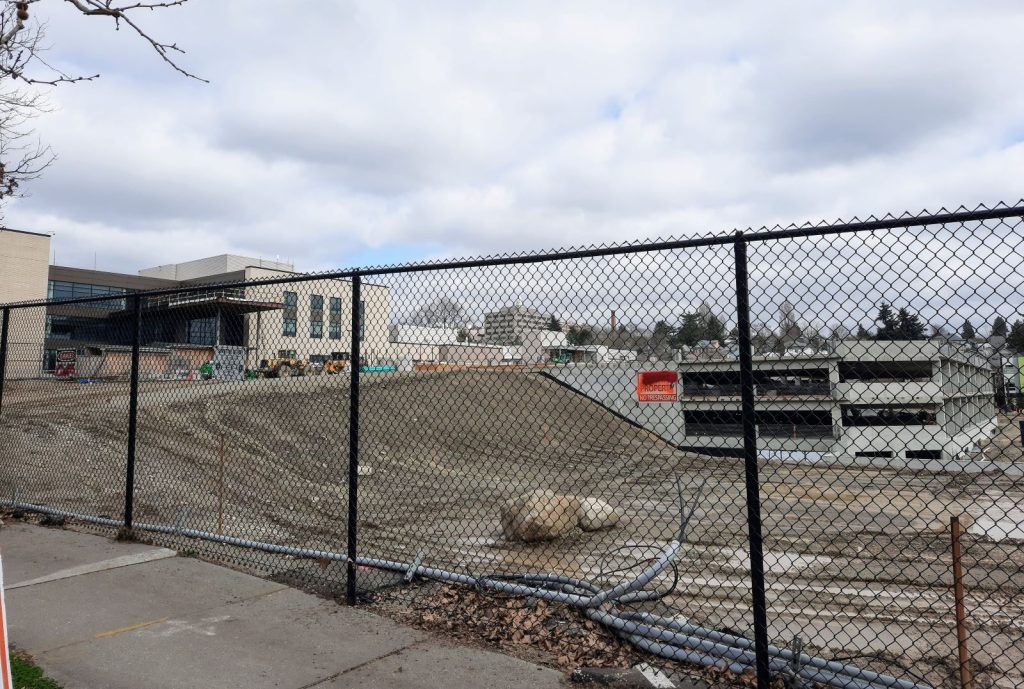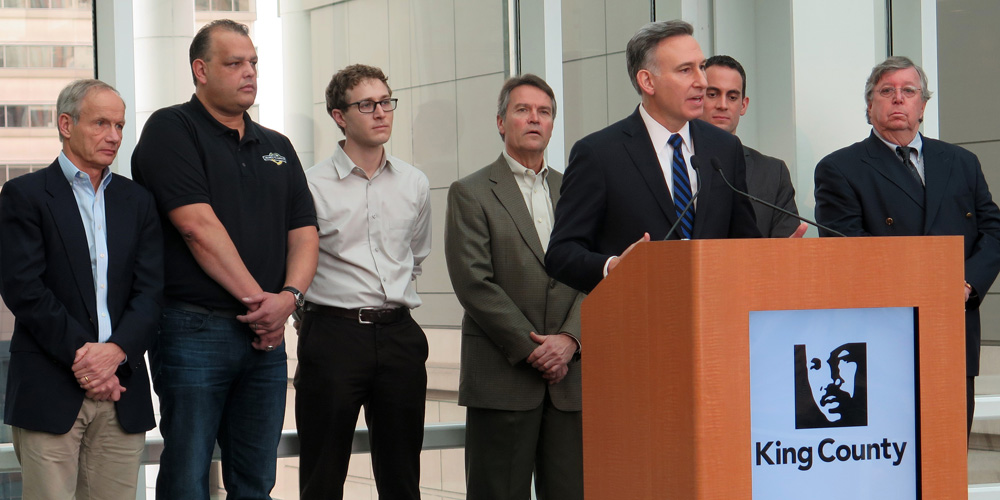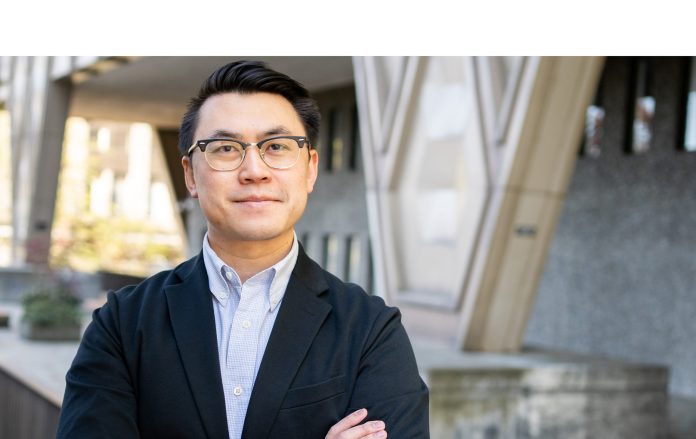State Senator Joe Nguyen (D-White Center) announced his bid for King County Executive last week, promising a “New Deal for King County.” The move added immediate excitement to a sleepy race that had looked like a coronation for the incumbent. Executive Dow Constantine is seeking a fourth term and didn’t have a serious challenger until Nguyen jumped in, nor had he faced a strong challenge since his initial win in 2009 versus former Republican state party chair Susan Hutchison.
Now, he’s got one in Senator Nguyen, an outspoken progressive leader in the state senate running against him. Nguyen’s campaign stresses urgency on progressive priorities like climate change, wealthy inequity, racial justice, mobility justice, exclusionary zoning, and reducing homelessness through tackling root causes. He said expanding basic needs programs like Temporary Assistance for Needy Families (TANF) was one of his proudest accomplishments in Olympia. Systemic change was an objective for him both in legislative output and how the legislative body itself operated.
“When you’re inside of a system that wasn’t built for you — oftentimes the members of color in our first-year caucus talk will talk about this — the legislature clearly wasn’t built for people like us,” Nguyen said. “Whether it was women, whether it was people of color, whether it was young people or renters. It wasn’t built for us, and there’s all these unwritten rules.”
In past sessions, Nguyen wasn’t afraid to say which of his Democrat colleagues had held up major legislation, such as progressive tax reform or climate bills, breaking an unwritten rule of the legislature.
“When I came in, I didn’t know what the rules were. And if you saw a problem, you fixed it. If there was a problem, you called it out, and apparently people didn’t like it when you called problems out,” Nguyen added. “We got past it.”
Nguyen ran to the left of Constantine’s deputy chief of staff Shannon Braddock in the 2018 election and defeated her with a comfortable 16-point margin to win the District 34 senate seat. He has continued to be a progressive stalwart in the legislature. Rich Smith dubbed Nguyen “The AOC of the Washington state senate” in a glowing feature in The Stranger, which had also endorsed his 2018 campaign.
“Nguyen says he doesn’t care if he gets reelected. He wants to run the most progressive office in the Senate, and he wants to run it loudly, no matter the potential political consequences,” Smith wrote. “White Center should be proud.”
“Majorities are supposed to be used,” Nguyen told Smith. “I’m tired of a system that oppressed black and brown bodies and poor people. We need shit right now. People are dying right now. People are being pushed out of their homes right now. Fuck four years from now.”
Nguyen grew up in public housing in White Center with his three siblings, parents, and grandma. His parents were refugees from the Vietnam War. His childhood was altered when his dad was paralyzed in a car crash, which added even more financial strain on the family and new caregiving responsibilities. They survived thanks to TANF, the local food bank, and hustle.
“When I was 15, my second job was at the IMAX on the waterfront. Getting there would have taken me 15 minutes by car, but since my family couldn’t afford one for me, I spent an hour and a half commuting by bus,” Nguyen wrote in his transportation issues page. “Two decades later, there are still too many people who don’t have access to reliable public transit options in King County.”
State transportation package
Nguyen serves on the transportation committee and is optimistic a new transportation package could pass — even later this year in a special session — even though he’s critical of how Transportation Chair Steve Hobbs ran the process.
“It’s a little bit frustrating how we handle transportation in Washington state. I will just call that out,” Nguyen said. “I think it needs to be more inclusive, more forward-thinking, and less transactional. However, because it’s based off the climate package that we passed, I do think there is a path to pass a transportation package this year. Meaning it is a big enough deal that maybe in the next couple of months as things get hammered out, we potentially could go back to pass something.”
Slowly, transportation leaders in the state legislature are shifting their paradigm, Nguyen said. But right now, the transportation package needs to pass before the Climate Commitment Act can start investing carbon cap and trade proceeds. Hobbs’ preference to save as much gas tax revenue for highway expansion means Cap and Invest revenues may be spent on court-mandated fish culverts on existing highways rather than further boosting investment in transit and walkability.
“If you look at it four years ago, I think people would have just say build more roads, and there’s clearly pushback on that now,” Nguyen said. “The people like myself who want more multimodal, who want less concrete, who want to focus on vehicle miles traveled going down… I think right now you do have a contingent in the senate and the house who want the transportation package to be more equitable. That’s why you see language that relates to environmental justice that Senator Saldaña put in there.”
Nguyen lived environmental justice issues firsthand, as he noted on his climate page: “It wasn’t just the water that was toxic growing up in White Center, either. I had asthma growing up, like so many children of color growing up in communities experiencing disproportionate levels of air pollution. That reality persists today, despite decades of warnings from scientists and community advocates, unjustly shortening the lives of so many people in our county for no other reason than where they live.” He acknowledges that paradigm shift may not be fast enough to prevent the next transportation package to pass from being a highway-heavy one.
“I love Senator Hobbs as a person. I think he’s a fine individual. I would probably do things differently if I was chair of transportation,” Nguyen said. “The way we move forward has to be based on what is best for all of Washington state, not just what gets enough votes to pass. It’s weird, right. You have to pass the bill, which then requires you to think of all these projects, but these projects may not meet our actual long-term goals. So how do we change the paradigm to move away from this transactional politics to more inclusive and holistic and future-thinking?”
Transit for all
Nguyen’s transportation calls for free transit, and he sees it as a key way to meet the county’s climate goals and expand economic opportunity, and he thinks it can be funded in part by reprioritizing the budget. The King County budget is $12 billion per biennium and half of it goes toward the legal system — courts, jails, police — Nguyen said, adding he sees that as an opportunity to reprioritize.
“If you’re able to address root causes — oftentimes it’s poverty and crimes of poverty that takes up the majority of the budget for King County — you can feasibly shrink the amount we spend on our legal system and use that to cover some of the gaps in some of the things we invest in, whether it’s basic needs programs, whether it’s diversion programs, whether it’s behavioral health, which the County manages, or whether it’s transit and access to economic opportunities,” Nguyen said. “We have to shift the way we think about problems. We can’t do it in a silo. Transit is related to climate. It is related to economic opportunities. Economic opportunities are related to poverty. Poverty is related to crime, potentially as well.”
The pandemic proved that free transit is possible, Nguyen argues, pointing to the six-month period when King County Metro ceased fare collection as a Covid precaution, helping bus drivers physically distance from riders. Metro resumed fare collection in October once it had installed plexiglass barriers for drivers.
With his emphasis of long bus commute from White Center as a kid, Nguyen has stressed the need for rapid transit to underserved communities, such as the South King County one he grew up in. He said he hoped light rail would reach places like White Center, but also wanted to see RapidRide bus buildout in the interim.
He stressed stronger execution of the Sound Transit 3 program, pointing to the billions in cost overruns and the Sound Transit CEO having anger management issues as unforced errors that should be addressed. Getting those things right would build public confidence and help build momentum for more rapid transit expansion, he argued.
Ending apartment bans
In addition to transit for all, Nguyen pointed to the need for greater investment in social housing, less restrictive zoning policies, and more density and housing abundance in the county. He also wanted to see cross-laminated timber construction to lower buildings emissions, and fast approvals and permitting processes to ensure enough housing is built.
“We also need to work with local jurisdictions on zoning laws, especially exclusionary zoning laws,” Nguyen said. “I’ve supported just about every density bill that was out there — even when they weren’t politically popular — because we need more housing, and we need to do it in a just way.”
He argued support for housing projects would be stronger when leaders listen to what local needs are and help add resources, services, and amenities along with those projects. Nguyen pointed to the Rise Together project in White Center that is linking nonprofit services and transit upgrades with a new social housing project. Nguyen said he’s had the conversations to figure out what communities like White Center and Skyway need to grow in an equitable way and believes there’s support for density there. Land use decisions in unincorporated parts of King County like Skyway and White Center are determined by the King County Council and Executive.
Closing the youth jail and investing in the poor
One major criticism Nguyen has of Executive Constantine is how he handled the County juvenile detention center.
“If your goal is to lower youth incarceration rates, building a bigger jail doesn’t seem congruent with those goals,” Nguyen said. “If your goal is to help youth, and incarcerating them is the mechanism to do it, that doesn’t work. That’s part of a legacy mindset from the 80s when we had a failed war on drugs, and we incarcerated Black and brown people.”
Although the County passed a ballot measure in 2012 funding the construction of the new $242 million facility in the Central Area, the language didn’t stipulate the size of the juvenile detention center or even mention juvenile detention directly. Officially it’s called the Children and Family Justice Center, which granted does poll better than jail cells for kids. A coalition called No New Youth Jail that included Nikkita Oliver and many other criminal justice reformers and abolitionists demanded the City and County not build the facility, but ultimately succeeded only in getting a reduction in beds and a pledge to end youth incarceration by 2025.

“I would have gone for something more community-based. One of my first bills was a diversion program that allowed for law enforcement to divert youths away from the criminal justice system. So they didn’t have to go through with it in the first place. To me that is why fundamentally we’re different in how we would approach a problem,” Nguyen said. “I would have listened to community while things were happening, not making a decision and then after the fact using all the funding on something that we are now going to try to close. It makes no sense from a good governance perspective. It makes no sense from a listening to community perspective as well.”
His criticism also goes to the County lurched into heavily investing in deterrence and the war on drugs rather than solving for root causes. The pandemic exposed underlying racial inequities and should be a wake-up call, Nguyen argued, pushing the County to do things differently rather than do the same old things and expect a different result.
“Back in the 80s, our system, whether in Washington state, King County, or otherwise, we used to spend the same amount of money on law enforcement and policing and the judicial system as we did on basic needs and human services,” Nguyen said. “After the war on drugs, we saw less money going toward human services, and more money going toward the legal system.”
Investing more in upstream solutions would get better results, he argued.
“Instead of addressing the root causes of poverty, which oftentimes can lead to crime, we just criminalized poverty and then made those people worse off because of it,” Nguyen said. “What I’m saying is not actually radical. It’s what we used to be doing back in the 80s… It’s going back to a more humane system.”
Building trust to make regional homelessness approach work
Another criticism Nguyen made is that Executive Constantine has failed to galvanize municipal leaders behind the Regional Homelessness Authority. As an example, he pointed to the eight cities that opted out of Constantine’s sales tax measure funding the acquisition of housing for homeless folks last year.
“If this is a regional approach, there has to be a partnership and a trust between the various jurisdictions. From my conversations I’ve had with local leaders across the very suburban areas, and there seems to be a distrust in terms of the County’s efforts versus theirs,” Nguyen said. “What I’ve seen so far is that because of that mistrust, it leads to unnecessary tensions. Those that are most impacted by it are those that need the help the most.”
Again, Nguyen favors upstream solutions to band aids on symptoms.
“During the last recession, the legislature cut funding for basic needs, cut funding for TANF, cut funding for behavioral health, cut funding for mental health. They even increased costs for, say for instance, higher education. So all the things we know that can alleviate poverty, we basically made it more difficult for people to achieve,” Nguyen said. “Yet we saw this extreme wealth inequality that happened during the same time where we saw tech companies do very well.”
That tech boom helped drive up housing costs and the cost of living right as human services were being slashed.
“That confluence created the homelessness crisis that we have right now,” Nguyen said. “And Seattle and King County are not unique. A lot of other jurisdictions around the country have the same problem. However, we can change it. We can fix it. The budgets that we’ve passed at the legislature this year takes a huge step toward that, but where the rubber hits the road really is at the County level. The basic needs programs, the services, the regional approach to homelessness, that all happen at the County level.”
Nguyen sees his own experience with living through poverty and seeing public programs from the end user side as giving him an advantage.
“Quite candidly why I’d be good for the role is because I have a lived experience of failed policy. I have a lived experience of good policy as well. That’s why we had access to public housing,” Nguyen said. “So I’ve seen what happens when you don’t invest in communities. I’ve also seen how transformative it could have been to me to have some of these things in place… When you have people with lived experiences and personal impacts on policy, they fight with more urgency to get it fixed.”
The campaign ahead
Nguyen noted Monday that his campaign (check out his website here) had already seen a heartening outpouring of support and raised $60,000. Nonetheless, he has a challenge taking down a three-term incumbent who has already raised a million dollars. Executive Constantine is likely to count on support from the Big Business and has taken steps to court it. For example, Constantine rushed in to offer a $100 million loan to the Washington State Convention Center late last year that ultimately wasn’t necessary after the bond market for convention center debt rebounded.

Constantine also worked with Mayor Jenny Durkan in a failed attempt to pass a King County payroll tax that appeared aimed at undercutting larger progressive payroll tax proposals from Seattle City Councilmembers Teresa Mosqueda and Kshama Sawant and reducing the hit to large employers like Amazon.
Even with the advantages of incumbency, there are some signs voters are open to shaking things up when progressives challenged long-time incumbents. For example, David Hackney defeated incumbent Rep. Zach Hudgins last year and Girmay Zahilay bested long-time King County Councilmember Larry Gossett in 2019. However, there’s also plenty of examples of progressive challenges coming up short.
Whatever happens, the coronation appears to be over. We have a race on our hands.
Doug Trumm is publisher of The Urbanist. An Urbanist writer since 2015, he dreams of pedestrian streets, bus lanes, and a mass-timber building spree to end our housing crisis. He graduated from the Evans School of Public Policy and Governance at the University of Washington in 2019. He lives in Seattle's Fremont neighborhood and loves to explore the city by foot and by bike.


